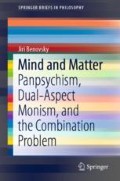Abstract
The combination problem is perhaps the biggest challenge to pan-(proto)-psychism. In this chapter, I distinguish various types of the problem, especially the ‘easy’ combination problem, and the ‘hard’ combination problem. I indicate the solution to the easy problem, and I discuss some resources that are needed in order to solve or avoid the hard problem, namely panprotopsychism and eliminativism.
Access this chapter
Tax calculation will be finalised at checkout
Purchases are for personal use only
Notes
- 1.
Sam Coleman puts it nicely: “There is little challenging in the notion of taking ingredients, each with a certain qualitative character, and putting them together into a whole whose macroscopic qualitative character is the intelligible product of the qualities of the components plus their arrangement. There are a few different relevant conceptual models we have available from everyday life, and it might be that phenomenal qualitative combination conforms to any one (or more) of these. Again, phenomenal qualitative combination may have its own rules; but there seems little reason to think there is anything much more conceptually challenging in such combination than there is in the everyday models of qualitative combination” (Coleman 2014, p. 28).
- 2.
See also Goff (2017a, Chap. 7, especially §7.3).
References
Brenner A (2015) Mereological nihilism and theoretical unification. Anal Philos 56(4):318–337
Chalmers D (2016) The combination problem for panpsychism. In: Bruntrup G, Jaskolla L (eds) Panpsychism. Oxford University Press, Oxford
Coleman S (2014) The real combination problem: panpsychism, micro-subjects, and emergence. Erkenntnis 79:19–44
Coleman S (2016) Panpsychism and neutral monism: how to make up one’s mind. In: Bruntrup G, Jaskolla L (eds) Panpsychism. Oxford University Press, Oxford
Goff P (2017a) Consciousness and fundamental reality. Oxford University Press, New York
Goff P (2017b) Panpsychism. Stanf Encycl Philos https://plato.stanford.edu/entries/panpsychism
Heller M (2008) The donkey problem. Philos Stud 140(1):83–101
James W (1890) The principles of psychology. H. Holt and Company, New York
Author information
Authors and Affiliations
Corresponding author
Rights and permissions
Copyright information
© 2018 The Author(s)
About this chapter
Cite this chapter
Benovsky, J. (2018). The Combination Problem(s). In: Mind and Matter. SpringerBriefs in Philosophy. Springer, Cham. https://doi.org/10.1007/978-3-030-05633-9_4
Download citation
DOI: https://doi.org/10.1007/978-3-030-05633-9_4
Published:
Publisher Name: Springer, Cham
Print ISBN: 978-3-030-05632-2
Online ISBN: 978-3-030-05633-9
eBook Packages: Religion and PhilosophyPhilosophy and Religion (R0)

